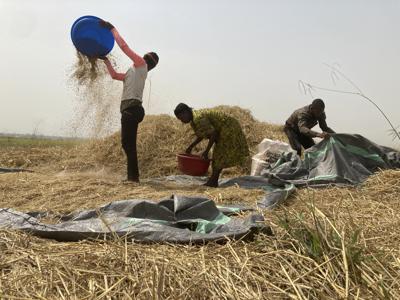By Chinedu Asadu
It’s 2 p.m. and Hannah Mgbede asks her husband if she can take her first break of the day from threshing rice so she can breastfeed their 18-month-old baby girl fastened to her back during the grueling work.
Her husband Ibrahim Mohammed, 45, used to harvest as many as 10 bags of rice a year from his farm. But that dropped to just three bags after attackers burned his home to the ground a few years ago, as violence between farmers and herders escalated across the northwest and central parts of Nigeria.
With that decreased yield, Mohammed hasn’t made enough money to buy seedlings to grow yams, soybeans and guinea corn (sorghum).
“Sometimes we manage to eat once (a day),” says Mohammed, who has three children, aged five and younger. “Since the crisis, it is only by the grace of God we are feeding to remain alive.”
Here in Benue state, harvests of rice, yams and soybeans were once so bountiful that it was called the “food basket of Nigeria.” But waves of violence over the last several years have reduced crops in the northcentral state of Africa’s most populous nation.
Credits | AP

